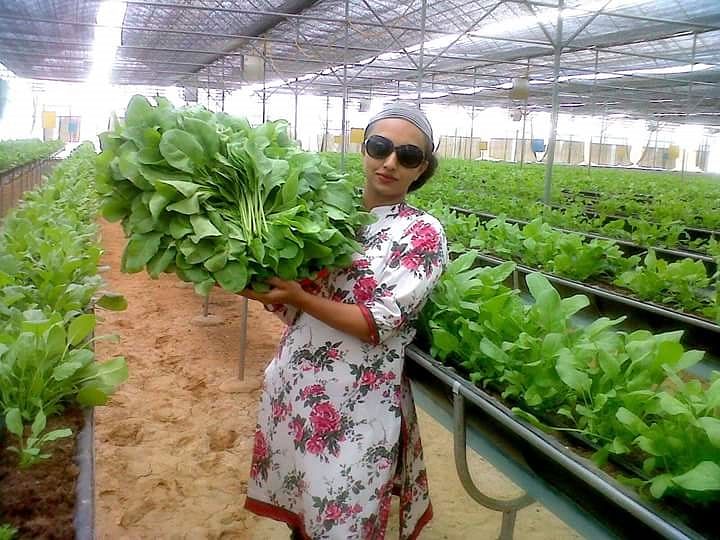
Remember the wildly popular game ‘Farmville’ on Facebook that allowed users to maintain a virtual farm and grow crops? Research had suggested that people were desperate for some connection with nature and were clutching at all straws available.
Fast forward to 2019 and more and more people are bringing Farmville to life in our very own Bengaluru. The concept of urban farming has caught on; young parents are among those making a beeline to farms on the city’s outskirts to get a hands-on experience of growing crops and teaching their children about the importance of the same; getting pesticide-free produce to take home in the process.
Why is it important?
"In today’s day and age, we are far removed from the source of our food. Kids, and even adults, are unfamiliar with natural ingredients and have little interest in knowing how fruits and veggies are grown,” says Gitanjali Rajamani, co-founder of ‘Farmizen’.
She says that adopting urban farming has two key advantages. “One, it allows you to get an understanding about how vegetables are grown, the process involved, the time it takes, and interact with local farmers. Secondly, urban farming can help you adopt a healthier lifestyle. You can grow vegetables that are fully traceable and free from chemicals.”
Why are youngsters opting for urban farming?
Sangeeta Bojappa Moorthy, recognised as one of the leaders of Hydroponics in the country, says, “Eco-consciousness as a concept is being talked about everywhere. When youngsters see adults falling prey to diseases, coupled with their own increasing levels of awareness and interaction, it is only expected that they will become conscious. Which is why we see many more balconies with plants, saplings being presented as gifts, people asking questions about what they are eating. Naturally the kids are pushed or attracted towards farming.”
Sangeeta is the pioneer for starting professional training in India for ‘soil-less’ cultivation and established the first hi-tech strawberry commercial cultivation greenhouse project in Bengaluru. She is also an advisor and mentor for many establishments.
urban farmer
‘It teaches value of food’
Shashichandra K, a technical architect, wanted to experience the fun of growing his own vegetables in his own space. His nine-year-old daughter, Sharanya S, accompanies him sometimes. “She helps me to harvest the crop; especially root vegetables like carrots. She compares the sizes of different carrots and learns about the process of growing vegetables in the process,” he says.
When asked why he felt this was important, Shashichandra makes an important observation. “It’s very easy for children nowadays to say that they don’t want to eat a particular thing but if she sees the effort put in to grow these vegetables, she might not do that. I want her to know the value of the food she is eating and how difficult it is to grow even a single thing.”
‘She asks what we are going to grow next’
Sangeetha Krishnamoorthy, a software professional with no farming experience whatsoever, decided to give Farmizen a try on an impulse, after seeing an ad on Facebook. Her six-year-old daughter Krutagnya tags along with her.
“Farming is a part of her life now. She knows where her food is coming from and is keen on identifying and knowing how to grow new vegetables and which veggies we will grow next.”
On the 600 sq ft plot in their name, Sangeetha can either tell the farmers what to grow there or try out some experiments herself. “Right now we are growing summer vegetables like brinjal and some gourds. Carrot, cabbage and cauliflower were grown in winter — you know the seasonality of vegetables when you grow them yourselves and you can plan what to grow,” she points out.
enjoys being on the farm.
‘Some parents are interested but they are hesitant to get their children along’
Dr Rajendra Hegde, a trustee of Garden City Farmers, an NGO comprising a group of urban community farmers, and co-founder of Biological Research Innovations Centre and Solutions (BRICS LLP), says that not all parents are enthusiastic about introducing their children to this concept though youngsters in general are quite interested.
“We conduct many workshops and sessions on terrace gardening, urban farming and more. About 35-40 percent of the participants are below 30 years of age. But they don’t bring their children. Some of the workshops are free of cost and even for the ones that are paid, we don’t charge children below ten years of age. Even then the participation of children is not even 10 per cent,” he rues. “We organise our events mostly on weekends but the parents tell me their children have karate, dance or sports classes and can’t come.” He is alluding to newcomers though; the regular members of their community and organic terrace gardening groups regularly bring their children for the events.
“Places like Jayanagar are an exception. When we conduct Chinnara Kaithota — an exclusive organic gardening workshop for children — we get almost 200 children in places like Jayanagar.”
Vegetables beat flowers as balcony gardeners’ choice
“The trend is towards growing your own food, very few people want to grow showy flowers in their limited space. Now I see very unusual vegetable gardens springing up in homes and small spaces. The internet helps by making available materials, tools and know-how,” says Sriram Aravamudan, former director, My Sunny Balcony.
“Concepts like organic gardening, reducing waste and composting are being included actively in school curriculae. Many schools even generate a lot of compost which they sell,” he adds.